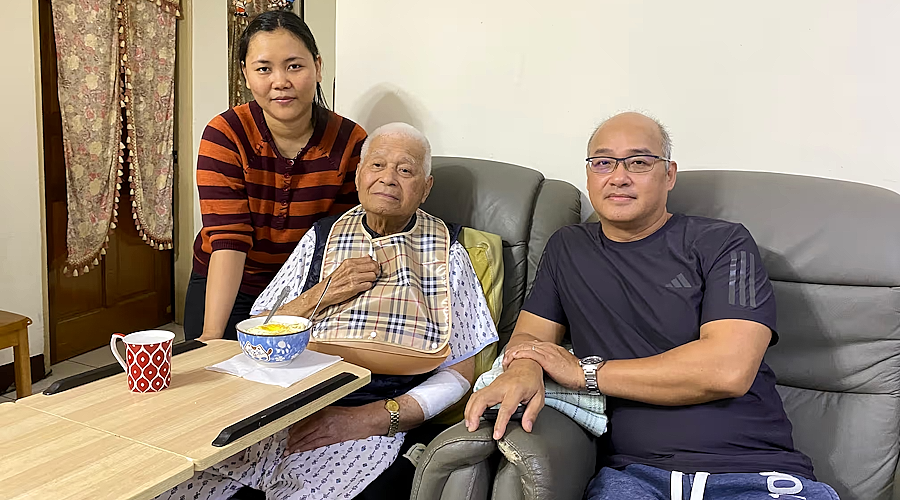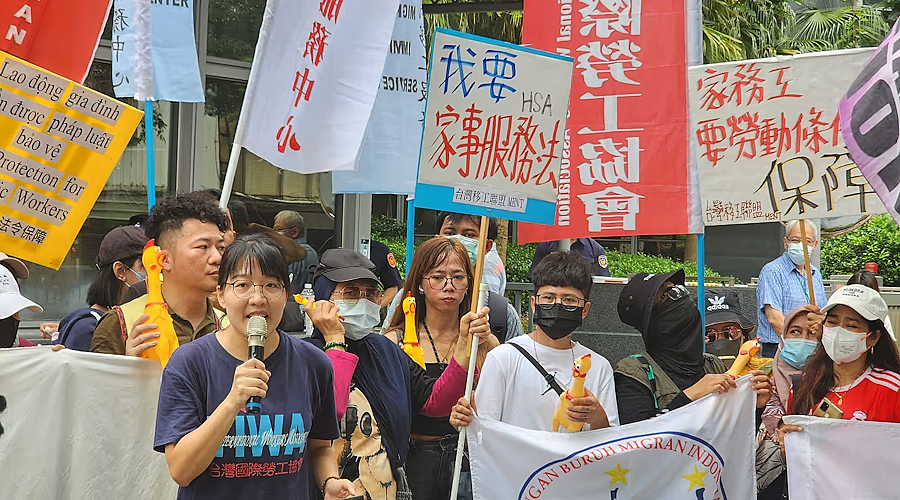
TAIPEI: Indonesian caregiver Astuti is preparing lunch for her elderly Taiwanese employer, and she is set on making it as mushy as possible.
The 26-year-old mashes silken tofu and mee sua in the wok until the mixture looks like white pulp.
“Ah Gong (Grandpa) cannot chew very well, but he likes to eat noodles. So this is what I do,” the Java native said in halting Mandarin.
Cooking is just one of the many things she does as a live-in caregiver to Mr Tong Fu-chien, an 86-year-old who has kidney disease and dementia.
For the past 1½ years, she has cared for him in his New Taipei City home, where he lives with his 52-year-old freelance television producer son, Mr Tong Shih-chieh.
After the senior Mr Tong wakes up, Ms Astuti—who like many Indonesians goes by one name—helps him from his bed to the living room couch before bringing him his toothbrush and cup.
Later, she records his blood sugar and blood pressure levels before administering his daily dose of insulin. Three times a week, she wheels him to a clinic for dialysis.
“She’s yi ji bang,” said the elderly Mr Tong, using Mandarin slang that means “first-rate.”
Foreign live-in caregivers like Ms Astuti are crucial in supporting Taiwan’s rapidly aging silver population amid a declining birth rate—a trend seen across East Asia.
But in a society heavily shaped by Confucian values, they also serve as surrogates practicing filial piety, stepping in when children of the elderly are unable to take on care work themselves.
“In Taiwan, it’s widely understood that the responsibility of caring for one’s parents should be kept private, within the comforts of one’s own home,” said the younger Mr Tong, who hired Ms Astuti to care for his father when his own commitments began to pile up.
“As my father’s only son, it’s only right that I do it this way.”

Changing norms in aging Taiwan
Today, it is common to see foreign caregivers pushing seniors in wheelchairs in Taiwan’s shopping malls and public parks, but this was not always the case.
When Taiwan opened its doors to foreign caregivers in 1992, only 306 were brought in.
The number has ballooned to 214,514 in 2024, according to official figures.
The majority hail from Indonesia (171,693, or 80 percent), followed by the Philippines (23,337, or 10.8 percent) and Vietnam (19,204, or 8.9 percent).
Several Taiwanese told The Straits Times that it would be unthinkable to send their parents to assisted living facilities, as it would be seen as unfilial.
According to a 2022 survey by the Ministry of Health and Welfare, 97.91 percent of Taiwan’s roughly four million seniors aged 65 and older live at home; only 2.09 percent reside in a care facility.
Hiring a foreign live-in caregiver is increasingly seen as “a solid compromise,” said Associate Professor Liang Li-fang, a sociologist at National Dong Hwa University who has researched Taiwan’s migrant caregivers for nearly 20 years.
“While a lot of elderly Taiwanese still have concerns about having a stranger in their home—and a foreigner at that—it has become more socially acceptable that one’s caregiver may not have any blood relations with them,” she told ST.
According to the same 2022 Health Ministry survey, only 1.28 percent of Taiwan’s seniors, aged 65 and older, said they would opt to live in institutional facilities if they had a choice; an overwhelming 91 percent would choose to live at home.
Out of this number, some 56.7 percent said they would like to live with their children, if possible.
With filial piety being a core family value in Taiwan, the majority of its elderly receive some form of financial support and care from their adult children, noted Professor Lin Ju-ping, a family science researcher at National Taiwan Normal University.
“Studies of East Asian families have found that compared with their counterparts in Japan, South Korea and mainland China, adult children in Taiwan adhere even more to traditional filial norms,” she said.
But the traditional expectation that children should be the main care providers for their elderly parents has evolved, driven by changes in family structures such as more women joining the workforce and amendments to government policies that have made it easier to hire foreign help.
“Ideally, elderly Taiwanese would want to be looked after by their own children. But that’s not realistic for many families, so they have to outsource the work,” said Prof Liang.
Foreign caregivers are seen as the next best option, as local ones cost more to hire.
Taiwanese caregivers typically charge upwards of NT$50,000 (RM7,070) a month, while foreign ones are paid a minimum monthly salary of NT$20,000 for the same services.
The shift in mindset comes as Taiwan is on track to becoming a “super-aged” society by 2025, when more than 20 percent of its population of 23.4 million will be aged 65 or older.
While several economies across East Asia are also grappling with the effects of such a trend, the pace of aging in Taiwan is among the fastest ever seen.
This shift is driven by longer life expectancy and plummeting birth rates. In 2024, Taiwan’s total fertility rate plunged to 0.89—one of the lowest in the world. Singapore’s total fertility rate in 2024 was 0.97.
At the same time, the average household size in Taiwan has become smaller as more young people live on their own, shrinking to a record low of 2.52 people per household in 2024.
This is below Singapore’s 2024 average household size of 3.09.
Given the traditional gender norms in Taiwan—where women often shoulder more caregiving responsibilities—an increase in female participation in the workforce has created a caregiving gap at home.
In 1994, the participation rate was about 44 percent, growing to 51.6 percent in 2022.
Ms Astuti, a caregiver from Indonesia, assisting her elderly charge with his daily routine and medical needs in Taipei. ST VIDEO
Caregiver policies, Taiwan-style
When Taiwan began allowing migrant workers to join its workforce in 1992, the goal was to address a labor shortage in specific industries, including caregiving, construction and agriculture.
Prof Liang noted that the island had looked towards Hong Kong and Singapore for lessons, as both places had introduced foreign domestic workers in the 1970s.
They were seen as relevant models because of their ethnic Chinese majorities and similar rapid economic trajectories.
However, Taiwan took a slightly different approach. Unlike Hong Kong and Singapore, where hiring foreign workers is largely driven by market demand and one’s ability to pay, Taiwan requires strict medical assessments to determine if someone truly needs a caregiver.
In addition, the roles foreign domestic workers take on differ between these places.
In Hong Kong and Singapore, they could end up handling a wide range of tasks—from household chores to childcare and eldercare.
Taiwan, however, clearly defines a caregiver’s job scope.
The majority of its foreign helpers are hired specifically to look after the elderly and those with disabilities.
A small proportion are employed to assist with childcare and household tasks, but only if families meet strict points-based criteria, such as having three children below the age of six.
Initially, foreign caregivers were allowed to work in Taiwan for a maximum of two years, with no option to return to the island.
As Taiwan’s elderly population has grown over the years, government policies have gradually eased.
Today, foreign caregivers can work in Taiwan for up to 12 years, with potential extensions of two years if they meet certain criteria, such as professional training.
In 2022, the government introduced a scheme allowing those who have worked for six consecutive years and meet certain salary and skill criteria to apply to be recognized as “intermediate skilled” manpower, a status that allows them to live in Taiwan without a time limit.
After five years in that category, they can apply for permanent residency.
As at February 2024, some 15,000 foreign caregivers had been designated intermediate skilled workers.
The hiring of a foreign domestic helper has also become less difficult—with Taiwan loosening restrictions several times—and it is set to become even easier.
In January, amendments to a law in the opposition-dominated legislature were passed to allow seniors aged 80 and older to bypass strict health evaluations when hiring foreign help.
Expected to take effect by July, the amendments will also extend the waiver to people aged 70 to 79 with stage 2 or more advanced cancer.
It is estimated that the revised law would make an additional 530,000 Taiwanese eligible to hire migrant caregivers.
Taiwan’s main opposition, the Kuomintang, believes this would help relieve the burden of younger Taiwanese caring for elderly family members.
But the government has criticized the amendments, with the Ministry of Labor warning that this could cause demand for migrant caregivers to outstrip supply.
Past data suggests that around 30 percent of eligible families are likely to apply to recruit a live-in caregiver, potentially creating sudden demand for an additional 160,000 caregivers, the ministry said.
Ms Astuti taking Mr Tong Fu-chien out for a walk as part of his daily routine. ST VIDEO
Families stay involved
Dr Chen Chen-fen, head of the Department of Long-term Care at National Taipei University of Nursing and Health Sciences, questions the need for hiring caregivers for seniors without disabilities.
“It’s understandable that older people would feel more at ease to have the option of 24/7 care, but they should make better use of some of Taiwan’s long-term care options instead, such as community centres for seniors,” she told ST.
“The idea that the elderly should be cared for at home, because of traditional family values, has made many Taiwanese families think that hiring a foreign caregiver is their only option.”
Prof Liang, however, believes that even as foreign caregivers play a growing role in caring for the elderly, the families remain in the picture.
“Even in the cases where the elderly live alone with their foreign caregivers, adult Taiwanese children are often very much involved—either visiting them often, or being the main communicator between their parents and the care worker,” she said.
“In this sense, the main responsibility of caregiving still lies with the care recipient’s family.”
Dr Lynn Yu Ling Ng, an expert on migrant care workers and a Banting postdoctoral fellow at Canada’s York University, observed more than 30 households across Singapore and Taiwan, where she interviewed caregivers and employers.
She found that live-in foreign caregivers in Taiwan would often share the care burden with their female employers who had day jobs, wherever possible—a practice which was less obvious in Singapore.
“Taiwanese employers were more likely to be personal carers who were being assisted, rather than replaced as family caregivers,” she said, attributing this to both filial norms and the relative difficulty of securing a caregiver.
The strict medical requirements in the hiring process mean that Taiwanese employers are forced to learn how to do care work themselves, and remain very involved even after they have hired a caregiver.
She added: “The old people in Taiwan—they don’t feel that the migrant caregiver can take over what they think should be the natural duty of their own children.”
The younger Mr Tong moved back into his old family home to live with his father a year ago—around the same time he hired Ms Astuti. He sees his wife and two adult sons on weekends.
“I hired a caregiver for my father to have peace of mind, so that there would be someone watching him whenever I cannot be around,” he said.
Ms Astuti conversing with her elderly charge in simple Mandarin, which she had to learn after moving to Taiwan. ST VIDEO
A progressive society, but cultural barriers remain
While Taiwan may have become more open to hiring foreign caregivers, settling into a new household presents hurdles, with the language barrier being a major one.
This is unlike more multicultural societies such as Singapore and Malaysia, where many families can communicate in English with Filipino domestic workers, and often in some Malay or Bahasa Indonesia with Indonesian helpers.
Foreign caregivers heading to Taiwan often have little or zero exposure to Mandarin before their arrival, which increases the chance of miscommunication.
Some Taiwanese families also lack an understanding of caregivers’ religious customs.
Indonesian caregiver Ririn Arumsari told ST that she lost 20 kg in the first three months after her arrival in Taiwan in 2012.
At the time, she was assigned to care for an elderly grandmother in Tainan city.
The employer’s family was aware that as a Muslim, she does not consume pork, but they “did not care about it,” said Ms Ririn.
“The employer would keep giving me meals with pork in them, even after I pointed it out several times. They didn’t treat me with respect.”
Prof Liang said that in the early days of her research, she came across more than one Taiwanese employer who would demand that their Indonesian caregivers remove their headscarves.
“Taiwan is much more culturally homogenous than Singapore, and there are seniors who have never seen a Muslim head covering before in their life,” she said.
“In order to not stand out too much when they’re out in the community together, they would forbid their caregivers to wear them.”
And despite Taiwan’s reputation as one of Asia’s most progressive societies, activists say that discrimination against Southeast Asian migrant workers, including caregivers, is a perennial problem.
Under Taiwanese regulations, foreign caregivers are supposed to focus solely on care work. But in practice, this rule is often flouted.
“Because they live in their place of work, foreign caregivers are often treated as household servants. Instead of just caring for the elderly, they are often asked to also clean the whole house and prepare meals for the entire family, 24 hours a day with no rest,” said Mr Lennon Wang, a director at Serve The People Association, a non-governmental organization advocating for migrant workers.
As foreign caregivers are often hired via a broker system—where private employment agencies act as intermediaries between caregivers and employers—workers are also subject to potential exploitation by bad actors.
Activists say it is not uncommon for brokers to hold workers hostage by withholding access to their passports.
Despite charging exorbitant fees, some agencies shirk their responsibilities altogether, such as by refusing to help workers settle any disputes with their employers.
At a workers’ protest rally in Taipei in May 2024, Indonesian caregiver Maesaroh said that in her home country, she had signed a contract to come to Taiwan to take care of an elderly man. But it turned out that she also had to do back-breaking farm work.
When she asked her broker for a change in employer, the broker was not on her side.
“They threatened me, saying that if I switched to another employer, I would have to pay tens of millions of Indonesian rupiah as penalties for violating the contract,” Ms Maesaroh said, tearing up.

‘I see her as another daughter’
Still, there are many positive stories to be told, with some foreign caregivers becoming extended family members in Taiwanese households.
In the southern city of Tainan, ST paid a visit to Madam Lee Shu-ru, 80, who lives alone with her Indonesian caregiver Nunung Nurani, 39.
Madam Lee has Parkinson’s disease and needs help with walking. Before hiring Ms Nunung two years ago, she had fallen twice, fracturing different bones. She is grateful for her caregiver’s watchful eye.
“I see her as another daughter,” said Madam Lee, whose three adult children work in different parts of Taiwan.
The increase in the number of South-east Asian migrant workers has also made Taiwan more culturally diverse.
Taipei Main Station, the massive transport hub of Taiwan’s capital, has become a home away from home for many Indonesian migrant workers, who gather in the central atrium and catch up with their friends.
At Beiping West Road, a hidden alley diagonally across from the station, local residents and Indonesians alike browse stores hawking Indonesian food and groceries.
Some employers like Mr Tong Shih-chieh go the extra mile to treat their caregivers like family.
Whenever he is in Taoyuan, a city west of Taipei, for work, Mr Tong will stop by the district of Zhongli to shop for Indonesian instant noodles and snacks for Ms Astuti.
“She likes more intense flavors—and deep-fried snacks,” Mr Tong said.
He appreciates the vital role that foreign caregivers play in Taiwan, where adults such as himself are unable to provide their parents with round-the-clock care.
“It’s only right that we treat these foreign caregivers decently, because you hope that they will, in turn, take better care of your loved ones. It’s about showing each other mutual respect.”
Hearing this, Ms Astuti broke into a smile.

ADVERTISEMENT
ADVERTISEMENT








































